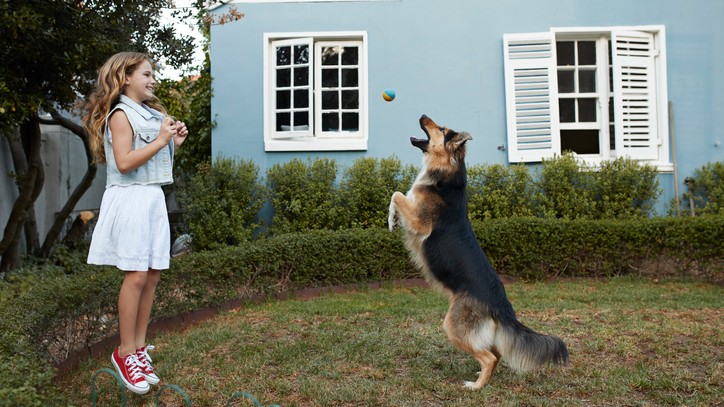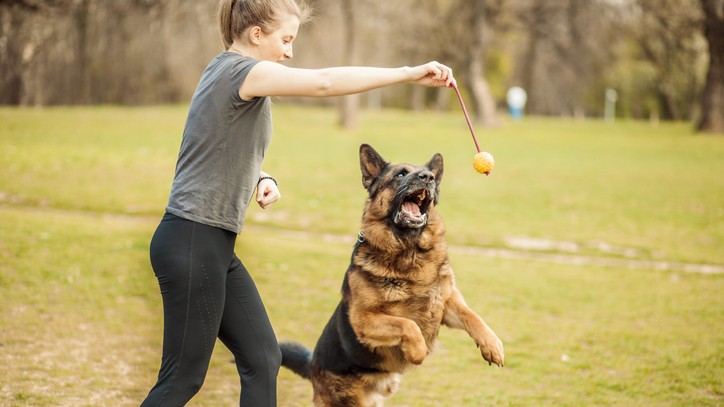Are german shepherds good family dogs?
Are German Shepherds good family dogs? Read this if you're thinking of adding one to your pack

They're well known for being working canines but are German Shepherds good family dogs? If you're considering bringing one into your home, then it's important to know if they're going to fit in. After all, the German Shepherd breed is medium-to-large, has a good set of gnashers and is used by police to chase criminals. It’s natural that potential pet parents may be a little wary.
Yet despite potential reservations, German Shepherds are a common choice. They’re the second most popular dog in the United States, according to the American Kennel Club, and, while the number of German Shepherds registered in the United Kingdom is lower today than at the breed's peak in 2010, they still rank highly.
But why? Aside from being a beautiful breed, German Shepherds have proven themselves time and again to be courageous and confident. They’re also superb guard dogs and quick to learn, which means they're easily trainable. In that sense, it’s no surprise that they’re loved by the police, armed forces and security teams. But are these attributes ideal for families?
Are German Shepherds usually aggressive?
There’s no doubt that German Shepherds are smart cookies. According to the professor of canine psychology at the University of British Columbia, Stanley Coren, they’re the third most intelligent breed and their innate ability to guard should mean they know how to keep their family safe. Their even touted to be among the best service dog breeds and best therapy dog breeds.
Yet, given how muscular German Shepherds are, you don't want to get on the wrong side of them. They have a bite force as powerful as 238 pounds per square inch so the damage caused could be catastrophic. They’re also known to have killed people: between 2010 and 2020, 21 people died in an attack by a German Shepherd – 13 of them being the dog's owner or family.
Now, that may be setting alarm bells ringing but it’s not quite as bad as it sounds. Yes, German Shepherds have a reputation for suddenly attacking yet the trait has been largely eliminated through selective breeding. If you also put all of this into perspective, you're looking at about two deaths per year for a hugely popular breed. That is not to say, German Shepherds are trouble-free, however.
Training is vitally important if you're going to take this breed into your home as a family pet. Without sufficient socialization, the dog's territorial and dominant nature will likely surface and this is what leads to aggression. The key, then, is to take lots of time to nurture a German Shepherd's gentle side so that the pet becomes a protective and loving pooch rather than one that is overly wary of strangers or reacts badly in certain situations.
PetsRadar Newsletter
Get the best advice, tips and top tech for your beloved Pets
In that sense, families will need to take extra-special care. They also need to teach children how to behave around dogs but, so long as kids are respectful and avoid negative interactions, there should be very few to no problems.
Indeed, German Shepherds are friendly around children. They love to engage and play and become firm friends, bonding quickly. They're not vicious day to day and they can be extremely well-mannered, even able to perform delightful tricks and goof around. So, to answer the question, no, German Shepherds are not usually aggressive. But they can be and, if they are, it's not pleasant. And that's something you need to bear in mind.

What is bad about German Shepherds?
So, aggression aside, is there anything else you should be warned about? Well, it all depends on your own situation. Family life can be very hectic: you wake up in the morning, the kids need help getting ready for school, you're looking to sort yourself out for work, there's toast popping up, cereal spilling on the floor, the doorbell is ringing and the car won't start. Where does your pet fit into all of this?
Well, first of all, a German Shepherd needs lots of physical and mental stimulation throughout the day. As extremely active dogs, they can't just sit around on the couch chilling out.
It means you need to give them a minimum of two hours of exercise each day and you must question whether or not you actually have the time to do this. If you're an active family, then you can enjoy the activity together or, if you have a large family with children who are old enough, you could take it in turns. But if the thought of so much exercise fills you with dread, then this is a bad thing indeed!
The consequences can be dire. If you don't give a German Shepherd enough attention or fail to burn off their excess energy, the breed can become destructive. They can end up barking and chewing on furniture.
But that’s not all. German Shepherds are also big dogs so they're not ideal pets for small or cluttered homes where they're likely to knock things over. What's more, there are some German Shepherd health issues that you need to think about including hip dysplasia, degenerative myelopathy, anal furunculosis, exocrine pancreatic insufficiency and epilepsy. Taking on a German Shepherd is a big commitment.
Are German Shepherds high maintenance?
Simple answer? Yes. Aside from needing lots of exercise, unlike low maintenance dog breeds, German Shepherds shed loads and they do so each and every day. They also need to be groomed on a regular basis otherwise their coat can become matted and dirty.
German Shepherds can also suffer from separation anxiety which is another issue families have to consider if someone isn't at home all day. In that sense, it's worth looking at how to reduce separation anxiety in dogs so it becomes less of an issue but, really, having someone around is preferable.

Should I get a male German Shepherd or female?
Some of the problems mentioned can be alleviated if you go for a female German Shepherd. The males tend to be more aggressive which means females are generally a better fit for a family.
Even so, you are going to lose some of the benefits of owning a German Shepherd – the females are less protective and less likely to guard as effectively. But if you don't necessarily want a territorial dog, you’re going to be gaining a generally sweeter and friendlier pet.
So are German Shepherds good family dogs?
Well, it's not so clear cut. On the one hand, yes. They are lovely dogs who will care for you and your family and become an integral part of all your lives. You only need to read through these “pawsome” German Shepherd facts to understand just why you'll adore this breed.
On the other, a different dog may suit you better. Maybe assess a Rottweiler vs German Shepherd or a German Shepherd vs Belgian Malinois – breeds that are similar in a lot of ways. In all cases, though, think about whether you have the time.
For when you're considering taking a German Shepherd into your family, time is the crucial factor: you need time to train, time to groom, time to exercise and also time for yourselves! Time prevents the breed from becoming aggressive and, most importantly of all, time ensures they become the lovely family pets that millions of people enjoy.

David Crookes has been a journalist for almost 30 years and he has written for a host of magazines, newspapers, websites and books including the World of Animals Annual, BBC Earth, Live Science, The Independent and Tom’s Guide.
Born in England, he lives with two cats but he’s also keenly interested in the differences between the huge number of dog breeds – in fact, you can read many of his breed guides that he’s written in collaboration with vets here on PetsRadar.
With a lifelong passion for technology, too, he’s always on the lookout for useful devices that will allow people to keep their pets happier and healthier, and provide them more time to spend together.
David has a degree from Durham University, as well as postgraduate diploma in journalism from the University of Central Lancashire.
